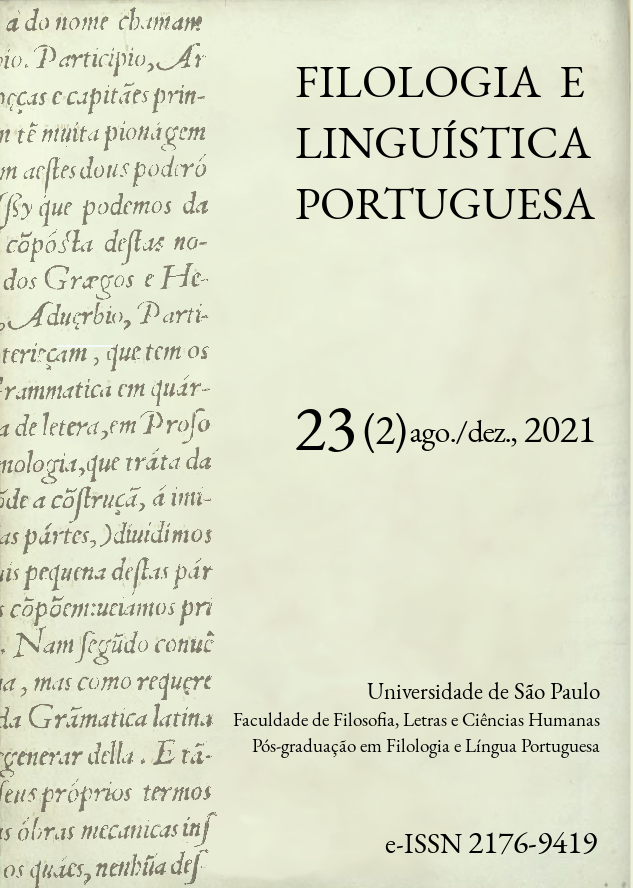Periphrasis with the verb dever in the portuguese translation of Vita Christi by Ludolph of Saxony
DOI:
https://doi.org/10.11606/issn.2176-9419.v23i2p151-166Keywords:
Periphrasis, Periphrastic conjugation, Semi-auxiliary verb, Verb dever, Vita ChristiAbstract
With this study we intend to identify the occurrences of the periphrases formed by the verb dever in the printed Portuguese edition of Vita Christi, what is their semantic value, what are the most common tenses of the semi-auxiliary verb, which pronouns depend on the semi-auxiliary verb and which are the main verbs in the infinitive. We will also refer to some particular cases, such as the reinforcement of the semi-auxiliary verb with another verb or verbal expression and the formation of complex periphrases.
The periphrases under analysis have the following configurations: dever + infinitive, dever + de + infinitive and dever + a + infinitive. The last two ceased to belong to standard Portuguese, being frequent in texts from the 15th century. The dever + infinitive periphrasis is still widely used in the Portuguese language today.
Vita Christi, which serves as the corpus for this study, is a religious work composed in Latin that tells the evangelical life of Christ, by Ludolph of Saxony (c. 1295-1377). Translated into Portuguese at the time of King D. Duarte (1391-1438), it was printed in Lisbon in 1495 by the German printers Valentino de Moravia and Nicholas of Saxony. Due to its length (1173 pages in four parts), it is a great base for studies about the characteristics of Portuguese in the 15th century.
Downloads
References
Alzamora HI. As perífrases verbais no português europeu contemporâneo [tese]. Universidade Nova de Lisboa, Faculdade de Ciências Sociais e Humanas; 2018.
Barroso H. Das perífrases verbais como instrumento expressivo privilegiado das categorias de natureza temporo-aspectual e simplesmente aspectual no sistema verbal do português de hoje. In: Gärtner E, Hundt C, Schönberger A, editores. Estudos de gramática portuguesa (III). Frankfurt am Main: TFM; 2000. p. 91-103.
Brocardo MT. Gramática e texto em diacronia - haver (mais-que-perfeito simples) de + infinitivo em duas crónicas de Zurara. Estudos Linguísticos. 2015;10:39-47.
Castro DJ. Discurso da vida de el-rei D. Sebastião. Caldeira IMB, editora. Braga: Edições Vercial; 2013.
Costa AJ. Estudos de cronologia: diplomática, paleografia e histórico-linguísticos. Porto: Sociedade Portuguesa de Estudos Medievais; 1992.
Góis D. Crónica do felicíssimo rei D. Manuel. Braga: Edições Vercial. Machado JB, editor; 2010.
Machado JB. Tratado de confissom: edição e estudo. 6.ª ed. rev. Braga: Edições Vercial; 2019.
Metzeltin M, Candeias M. Semântica e sintaxe do português. Coimbra: Almedina; 1990.
Nunes JJ. Compêndio de gramática histórica portuguesa. 9.ª ed. Porto: Clássica Editora; 1989.
Pérez M. Livro das confissões. 2.ª ed. rev. Machado JB, Moreira FAT, editores. Braga: Edições Vercial; 2013.
Saxónia L. Vita Christi. Vols. I, II e III. 6.ª ed. Machado JB, editor. Braga: Edições Vercial; 2019.
Torrego LG. Los verbos auxiliares: las perífrasis verbales de infinitivo. In: Bosque I, Demonte V, diretores. Gramática descriptiva de la lengua española. Madrid: Real Academia Española / Espasa Calpe; 1999. p. 3323-3389.
Downloads
Published
Versions
- 2021-12-30 (2)
- 2022-07-02 (1)
Issue
Section
License
Copyright (c) 2021 José Machado

This work is licensed under a Creative Commons Attribution-NonCommercial 4.0 International License.
Copyright is transferred to the journal for the online publication, with free access, and for the printing in paper documents. Copyright may be preserved for authors who wish to republish their work in collections.



















